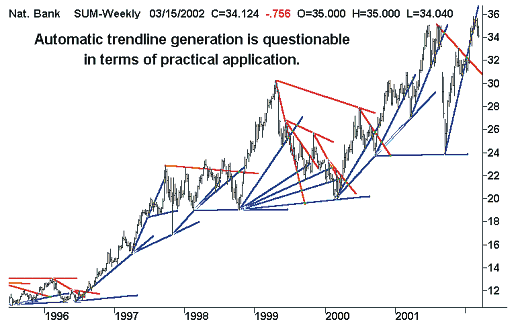- Active Investing - what is it?
- All Weather Trading Plan using Complex Theory (Parts 1 - 4)
- Asset Management (Parts 1 - 4)
- Back Testing
- Breaking out from consolidation
- Breakout trading in all market conditions
- Charting in a Nutshell
- Children of the Bear
- Fibonacci and the Golden Ratio
- Going Public
- Hull Moving Average
- MACD Breakout Trading (Parts 1 - 2)
- Making decisions with a Simple Moving Average
- Probability: do you have the stomach for it?
- Profit Taking
- Relative Strength
- Record Keeping
- Risky Business
- Short Selling
- Social Media Bubble
- Switching Gears
- Rate of Return indicator
- Time and Money
- Tools of the Trade
- Trade Warrants (Parts 1 - 4)
- Trading without spending money
- Trendlines
- Triangles
- GMMA's on Weekly Charts
- Writing Custom Indicators
Articles include:
Trading shares is a business like any other and, as with any business, it pays to investigate its financial viability before committing capital. I am often horrified by the conservative thinking that has the average mum and dad committing the family nest egg to a Bricks and Mortar retail business without any proper investigation whilst they would not even consider share trading as a viable business proposition, worthy of their consideration. Their reasoning behind blindly pursuing a retail business is that there are so many others out there doing it already.
What they don't know is that all those other people applied similar reasoning and now they are all working 50 to 60 hours per week to keep the Taxman and their Bank Managers happy. These people, in the majority, own Jobs and not Businesses where a business is defined as a profitable enterprise that can operate in the absence of its owner.
The man who gave me the above definition for a business also told me that Following the crowd means Jumping off a cliff at worst and Being average at best... neither being desirable. And, whilst running the risk of stating the obvious, share prices move without my being present, making share trading a valid Business proposition.
But here's the best part... I can completely assess the financial viability of any share trading strategy by using historical data and without risking a single cent. In the Stockmarket I can Back test any share trading strategy that I am interested in and, by testing and measuring its outcomes on paper, I can validate and optimise its performance before committing cash to it.
This poses an obvious Question
With this supposedly foolproof approach to Proving share trading strategies, why do so many people lose money in the Stockmarket?Answer
Because share trading to the majority of people is about individual shares and not about the strategy they employ.You're not very likely to test your strategy if your not focused on it or if you don't even have one to begin with. What's more, most people who do employ a market strategy will clearly put individual shares ahead of their strategy by Tweaking the latter so they will own the shares of their desire. However, this type of fools paradise would be virtually impossible to achieve if they performed thorough back testing. When back testing I am focused on the performance of my entire portfolio over an entire year and, as a direct result of this perspective, the behaviour of individual shares is of little interest to me.
But, like everyone else, I am an emotional creature who can become attached to a share that has rewarded me over time. So, whilst emotional detachment makes good commonsense, it is easier said than done. Here again we see the benefit of back testing because my ultimate loyalty lies with my bank account and I will sever my emotional connection with individual shares for the sake of nurturing the numbers at the bottom of my monthly bank statement. It is somewhat ironic that I maintain my trading discipline through greed.
Once we have our focus squarely adjusted onto our trading strategy and we are committed to the process of back testing, we must be ready to Test and Measure outcomes. In other words it is vital that we have and maintain a trading ledger or we will quickly collapse into a disorganised mess.
Another general benefit of back testing is the practice that we gain from it. Unfortunately the providers of modern charting programs would deny us this benefit by furnishing us with automated back testing functions. Not only does automated back testing ignore the fact that most of us could do with the practice but, in most cases, it doesn't work because our share trading strategy includes some form of qualitative analysis.
In other words our strategy can't be simulated by a computer algorithm. Although I am a devout user of Supercharts I find its automated functionality to be quite comical... the following chart illustrates this point well.

The last important point to be made about back testing is the need to keep it relevant. I am frequently questioned about my own back testing procedures and an eyebrow is often raised when I state that I only use historical data from the past 3 to 5 years. There is little point in using data from any further back, as it would be largely irrelevant to current market conditions.
Financial markets evolve over time and the Australian Stockmarket is no exception. Our market participated in the global bull market that started at the beginning of 1995 and our resource sector collapsed in October of 1997. These were key turning points in our Stockmarket's history and to employ data from beyond them is to risk being irrelevant. In developing my market strategy I am seeking profits... . not some unattainable, timeless, universal formula for success.